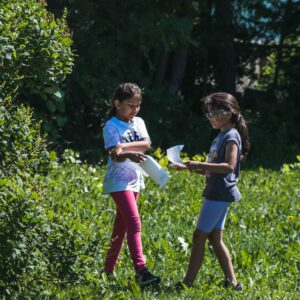All around the world, A Rocha’s environmental education programmes ignite a spirit of joy and curiosity towards God’s creation. In the northern hemisphere, we have had a fantastic summer of outings, camps and programmes centred on creation care.
Amid an immense drought in Southern California, A Rocha USA’s summer programme was all about water: where we get it, when it is safe to drink and how we can conserve it. With a variety of fun activities, children and their families learned how to be good stewards of this increasingly precious resource. In Texas, we host ‘Picnics en el Arroyo’ gatherings throughout the year in Spanish, which are engaging for whole families: children discover interesting critters during ‘BINGO de la Laguna’; teenagers compete to win the hiking scavenger hunt; and parents learn about birding.
Kara LeBlanc – an environmental educator at A Rocha Manitoba, Canada – explains how their summer programmes help kids who struggle to find beauty in their urban environment: ‘There is a lot of beauty! You actually have to look – there is a lot to see where you live. So, when we’re planning stuff I think, how can I help kids look?’ Sure enough, one camp leader, Emma Siemens, experienced a perfect example of this during a ‘photo scavenger hunt’ where kids practice observing nature:
– an environmental educator at A Rocha Manitoba, Canada – explains how their summer programmes help kids who struggle to find beauty in their urban environment: ‘There is a lot of beauty! You actually have to look – there is a lot to see where you live. So, when we’re planning stuff I think, how can I help kids look?’ Sure enough, one camp leader, Emma Siemens, experienced a perfect example of this during a ‘photo scavenger hunt’ where kids practice observing nature:
One day as we were walking to a nearby park, looking for a ‘unique tree’ to take a photo of, Lucy, age 10, said, ‘I think we could really take a photo of any tree, because every tree is unique. No two trees are exactly the same!’ In this moment Lucy was learning how to notice and appreciate nature in all its intricacies.
In all our education programmes, we connect people and nature to inspire action for a sustainable world. Here are more highlights from the A Rocha worldwide family this year:
At the beginning of the year, A Rocha Aotearoa New Zealand local group member from Christchurch, Steven Muir, hosted the Aranui Bike Fixup School Holiday Programme. Over five days, kids developed their love for biking and their skills in bike maintenance.
A Rocha USA’s Wild Wonder curriculum is used by churches, camps and other groups to help children learn about the wildly wonderful world God has made.
A Rocha France offers residential weeks at the Courmettes centre, with an eco-adventure camp for children and a variety of adult seminars.
In May, A Rocha India opened a new Rural Digital Literacy Learning Lab at their field study centre to provide students and villagers in the Bannerghatta Landscape with digital growth opportunities.
A Rocha Kenya teaches young people about biodiversity conservation in the Malindi-Watamu area.
A Rocha Peru conducts eco-club workshops at churches, organizations and schools. Children plant and harvest vegetables in the garden and learn about medicinal plants, composting, restoring dry forests and more.
A Rocha Portugal is celebrating 30 years of environmental education! They offer programmes on (1) birds and habitats of Ria de Alvor, (2) discovering pollinators and (3) microplastics and sea rubbish.
A Rocha Switzerland is offering nature workshops to support biodiversity conservation this September.
A Rocha UK has been hosting ‘Act for Nature’ days to teach about creation care and demonstrate conservation activities.
Alongside their schools conservation environmental education programme, A Rocha Ghana recently co-hosted a nationwide essay writing competition. Children ages 6-16 thoughtfully described how they would take care of our ‘One Earth’.